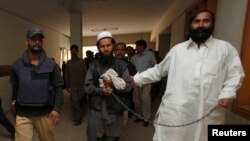ISLAMABAD —
Senior Afghan peace negotiators are being allowed to soon travel to neighboring Pakistan for a long-demanded meeting with the Taliban insurgency’s former deputy chief. Pakistani officials are promising more access in the future to facilitate the Afghan political reconciliation process.
Afghan officials say that Pakistan has agreed to arrange the meeting between members of Afghanistan’s High Peace Council and the Taliban’s former second-in-command to further peace efforts in the war-torn country. They have not disclosed dates for the proposed contact with Mullah Abdul Ghani Baradar.
Baradar was recently released from a prison in Pakistan but remains in the country. Afghan President Hamid Karzai had been demanding access to him, saying Baradar has enough clout to persuade leaders of the Taliban insurgency to end the 12-year-old conflict.
The decision to allow Afghan negotiators to meet with Baradar was taken in London on Tuesday during talks Mr. Karzai held with Pakistani Prime Minister Nawaz Sharif. The meeting was hosted by British Prime Minister David Cameron.
Speaking to reporters in Islamabad Wednesday, Sharif’s special assistant on foreign affairs, Tariq Fatemi, said that Pakistan has no objection to such a meeting. He added that both countries will benefit ahead of the planned withdrawal of most foreign forces from Afghanistan.
“Mullah Baradar was released at the express request of President Karzai when he had visited Islamabad [in August]," he said. "We are committed to promoting the peace process in Afghanistan. This peace process should be Afghan-owned and Afghan-led. We will play a supporting role because we recognize that peace and stability in Afghanistan is essential for peace and stability in Pakistan and we want to live as good neighbors.”
Still, Fatemi expressed caution on prospects for the talks.
“I don’t have expectations, but I have hopes,” he said.
He said that Baradar has been provided with enhanced security “to ensure his personal safety but he is a free man and can go anywhere he wants to." He added that Pakistan has no intention to extradite the Taliban former deputy chief.
Fatemi said that Baradar "will neither be handed over to Afghanistan nor will he be forced to move from one place to another."
Under pressure from Afghan and U.S. officials, Pakistan has released more than three dozen Afghan Taliban insurgents since late last year to further the reconciliation process in the neighboring country.
Speaking to reporters in Kabul, the U.S. ambassador to Afghanistan, James Cunningham, urged the Taliban to pursue the peace process instead of violence.
“That is really an Afghan issue. I don’t have an independent view about Mullah Baradar. But the High Peace Council has felt for some time that he could play an important role. So we are certainly supportive of the effort to try,” he said.
Baradar was trying to reach out to the Afghan government with a peace initiative but was detained while traveling through neighboring Pakistan in 2010.
On Tuesday, Prime Minister Sharif also formally called on the Taliban to become part of the Afghan reconciliation process, saying it will promote unity in Afghanistan and will lead to regional stability.
Afghan officials say that Pakistan has agreed to arrange the meeting between members of Afghanistan’s High Peace Council and the Taliban’s former second-in-command to further peace efforts in the war-torn country. They have not disclosed dates for the proposed contact with Mullah Abdul Ghani Baradar.
Baradar was recently released from a prison in Pakistan but remains in the country. Afghan President Hamid Karzai had been demanding access to him, saying Baradar has enough clout to persuade leaders of the Taliban insurgency to end the 12-year-old conflict.
The decision to allow Afghan negotiators to meet with Baradar was taken in London on Tuesday during talks Mr. Karzai held with Pakistani Prime Minister Nawaz Sharif. The meeting was hosted by British Prime Minister David Cameron.
Speaking to reporters in Islamabad Wednesday, Sharif’s special assistant on foreign affairs, Tariq Fatemi, said that Pakistan has no objection to such a meeting. He added that both countries will benefit ahead of the planned withdrawal of most foreign forces from Afghanistan.
“Mullah Baradar was released at the express request of President Karzai when he had visited Islamabad [in August]," he said. "We are committed to promoting the peace process in Afghanistan. This peace process should be Afghan-owned and Afghan-led. We will play a supporting role because we recognize that peace and stability in Afghanistan is essential for peace and stability in Pakistan and we want to live as good neighbors.”
Still, Fatemi expressed caution on prospects for the talks.
“I don’t have expectations, but I have hopes,” he said.
He said that Baradar has been provided with enhanced security “to ensure his personal safety but he is a free man and can go anywhere he wants to." He added that Pakistan has no intention to extradite the Taliban former deputy chief.
Fatemi said that Baradar "will neither be handed over to Afghanistan nor will he be forced to move from one place to another."
Under pressure from Afghan and U.S. officials, Pakistan has released more than three dozen Afghan Taliban insurgents since late last year to further the reconciliation process in the neighboring country.
Speaking to reporters in Kabul, the U.S. ambassador to Afghanistan, James Cunningham, urged the Taliban to pursue the peace process instead of violence.
“That is really an Afghan issue. I don’t have an independent view about Mullah Baradar. But the High Peace Council has felt for some time that he could play an important role. So we are certainly supportive of the effort to try,” he said.
Baradar was trying to reach out to the Afghan government with a peace initiative but was detained while traveling through neighboring Pakistan in 2010.
On Tuesday, Prime Minister Sharif also formally called on the Taliban to become part of the Afghan reconciliation process, saying it will promote unity in Afghanistan and will lead to regional stability.




